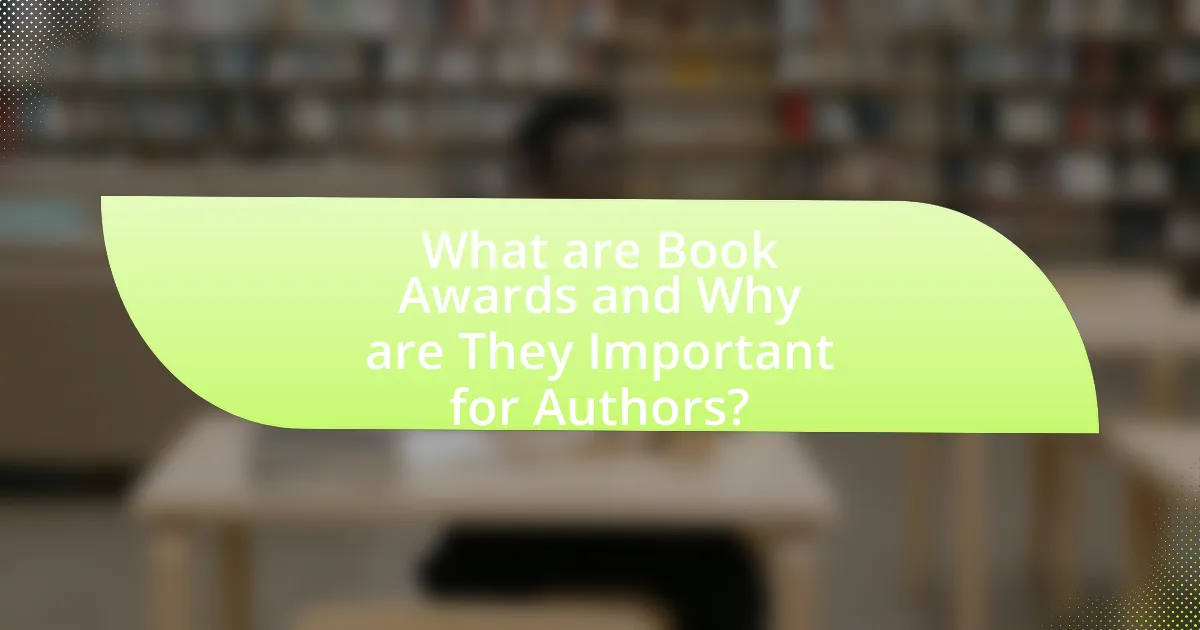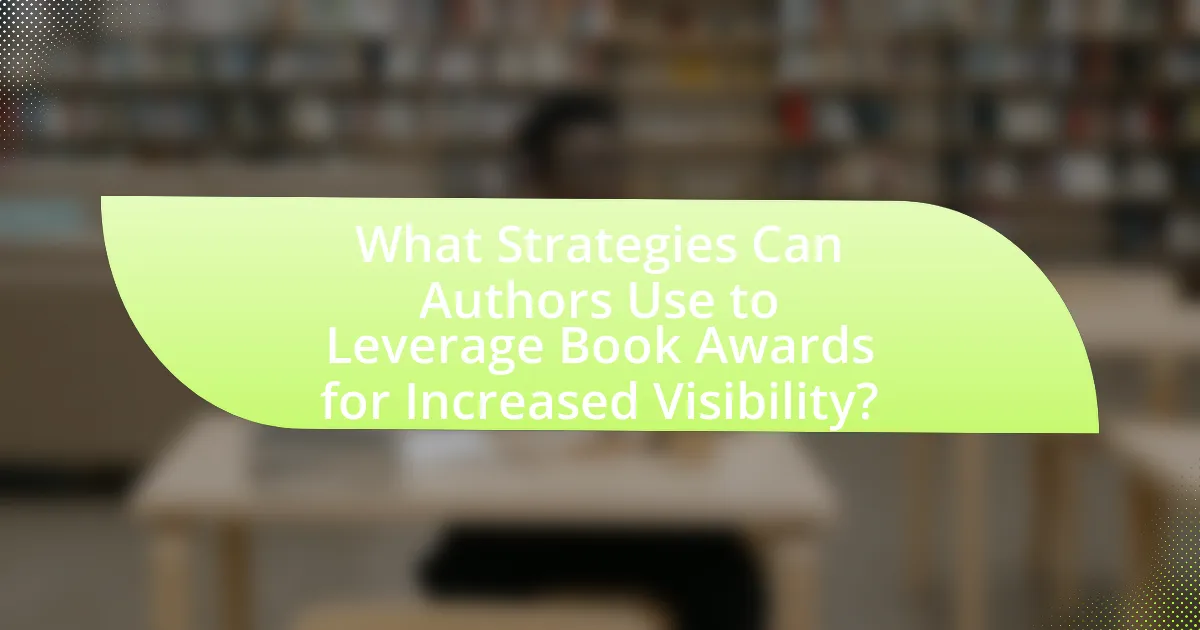Book awards are significant recognitions that enhance an author’s credibility, visibility, and marketability within the literary community. This article explores the importance of book awards for authors, detailing how they can lead to increased sales, media attention, and new publishing opportunities. It outlines various types of awards, including major literary and genre-specific accolades, and provides strategies for authors to identify suitable awards, promote their achievements, and leverage these recognitions to maximize visibility and career growth. Additionally, the article highlights common pitfalls in award submissions and offers practical tips for authors to effectively utilize their awards in marketing efforts.

What are Book Awards and Why are They Important for Authors?
Book awards are recognitions given to authors for outstanding literary works, often judged by panels of experts in the field. These awards are important for authors because they enhance credibility, increase visibility, and can lead to higher sales. For instance, winning a prestigious award like the Pulitzer Prize can significantly boost an author’s reputation and marketability, as evidenced by the fact that award-winning books often see a surge in sales following the announcement of the award. Additionally, book awards can open doors to new publishing opportunities and attract media attention, further amplifying an author’s reach and influence in the literary community.
How do Book Awards enhance an author’s visibility?
Book awards enhance an author’s visibility by providing recognition and credibility within the literary community. Winning or being nominated for a prestigious award often leads to increased media coverage, which can significantly boost an author’s profile. For instance, the Pulitzer Prize and the National Book Award have historically resulted in higher sales and greater public interest, as evidenced by a study from the University of Chicago that found award-winning books see a sales increase of up to 300%. Additionally, awards can open doors to speaking engagements, interviews, and collaborations, further amplifying an author’s reach and influence in the market.
What types of recognition do book awards provide?
Book awards provide various types of recognition, including validation of literary quality, increased visibility, and enhanced credibility for authors. Validation occurs when a book receives accolades from reputable organizations, signaling to readers and industry professionals that the work meets high standards. Increased visibility is achieved through promotional opportunities associated with awards, such as media coverage and inclusion in award-related events. Enhanced credibility stems from the association with established literary institutions, which can lead to greater trust from potential readers and publishers. These forms of recognition can significantly impact an author’s career trajectory and marketability.
How can winning a book award impact an author’s career?
Winning a book award can significantly enhance an author’s career by increasing their visibility and credibility in the literary market. Recognition from prestigious awards often leads to heightened media attention, which can result in more book sales and opportunities for speaking engagements. For instance, a study by the National Endowment for the Arts found that award-winning authors typically experience a 20% increase in book sales following their win. Additionally, winning an award can open doors to publishing deals and collaborations, as publishers are more likely to invest in authors with proven recognition.
What are the different types of book awards available?
There are several types of book awards available, including genre-specific awards, literary awards, and reader’s choice awards. Genre-specific awards, such as the Hugo Awards for science fiction and fantasy, recognize excellence within particular categories. Literary awards, like the Pulitzer Prize and the National Book Award, honor outstanding works across various genres and formats. Reader’s choice awards, such as the Goodreads Choice Awards, are determined by public voting, reflecting popular opinion. These awards serve to enhance visibility for authors and their works, often leading to increased sales and recognition in the literary community.
What are the major literary awards and their significance?
Major literary awards include the Pulitzer Prize, the Booker Prize, and the National Book Award, each holding significant prestige in the literary community. The Pulitzer Prize, awarded annually since 1917, recognizes excellence in journalism and the arts, enhancing the visibility and credibility of recipients. The Booker Prize, established in 1969, honors the best original novel written in English, often leading to increased sales and international recognition for authors. The National Book Award, initiated in 1950, celebrates outstanding literary work in the United States, providing authors with a platform that can elevate their careers. These awards not only acknowledge literary talent but also serve as marketing tools that can significantly boost an author’s visibility and readership.
How do genre-specific awards differ from general awards?
Genre-specific awards focus on recognizing excellence within a particular category, such as romance, science fiction, or mystery, while general awards evaluate works across multiple genres without specialization. This distinction allows genre-specific awards to highlight unique elements and conventions relevant to their respective categories, providing targeted recognition that resonates with specific audiences. For example, the Hugo Awards celebrate achievements in science fiction and fantasy, emphasizing innovation and creativity within those genres, whereas the Pulitzer Prize encompasses a broader range of literary works, including fiction, drama, and journalism, without genre constraints. This specialization in genre-specific awards can enhance visibility for authors within their niche, as they attract attention from readers and industry professionals specifically interested in that genre.

How to Identify the Right Book Awards for Your Work?
To identify the right book awards for your work, begin by researching awards that align with your genre and target audience. Focus on awards that specifically recognize the themes, styles, or formats of your book, as this increases the likelihood of recognition. For instance, the Hugo Awards are prestigious in the science fiction and fantasy genres, while the Pulitzer Prize is significant for literary fiction. Additionally, consider the award’s submission criteria, entry fees, and past winners to assess its relevance and prestige. Awards with a history of promoting authors and increasing visibility, such as the National Book Award, can provide substantial exposure.
What criteria should authors consider when selecting book awards?
Authors should consider the credibility, relevance, and eligibility criteria of book awards when selecting which ones to enter. Credibility ensures that the award is recognized within the literary community, which can enhance an author’s reputation; for example, prestigious awards like the Pulitzer Prize or the National Book Award have significant recognition. Relevance pertains to how well the award aligns with the author’s genre and target audience, as awards specific to certain genres can provide more targeted visibility. Eligibility criteria, including submission deadlines, entry fees, and specific requirements, must also be evaluated to ensure that the author can meet them without unnecessary complications. These factors collectively influence the potential benefits an author may gain from participating in book awards.
How does the award’s reputation affect an author’s decision?
The reputation of an award significantly influences an author’s decision to pursue it, as a prestigious award can enhance an author’s credibility and visibility in the literary market. Authors often seek recognition from well-regarded awards because winning or being nominated can lead to increased sales, greater media attention, and opportunities for future publishing deals. For instance, the Pulitzer Prize and the National Book Award are known to elevate an author’s status, often resulting in a substantial boost in book sales and readership. This correlation between award reputation and market success demonstrates that authors strategically consider the potential benefits of awards when making decisions about their work.
What role does the award’s eligibility criteria play in selection?
The award’s eligibility criteria serve as a foundational framework that determines which submissions are considered for selection. These criteria ensure that only works meeting specific standards, such as genre, publication date, and author qualifications, are evaluated, thereby streamlining the selection process. For instance, if an award specifies that only books published within the last year are eligible, this criterion effectively narrows the pool of candidates, allowing judges to focus on the most relevant and timely works. This structured approach not only enhances the credibility of the award but also ensures that the selected works represent the best within the defined parameters, ultimately contributing to the award’s prestige and the visibility of the winners.
How can authors research and find suitable book awards?
Authors can research and find suitable book awards by utilizing online databases, literary websites, and social media platforms dedicated to literature. Websites like BookAward.com and the Association of Authors’ Representatives provide comprehensive lists of awards categorized by genre, eligibility, and submission guidelines. Additionally, authors can join writing groups or forums where members share information about awards they have entered or won, enhancing their awareness of opportunities. Researching past winners of specific awards can also help authors determine if their work aligns with the award’s criteria and focus.
What resources are available for discovering book awards?
Resources for discovering book awards include websites like the American Library Association, which lists major literary awards, and the Goodreads Choice Awards, where readers vote for their favorite books annually. Additionally, platforms such as Book Riot and Literary Hub provide curated lists and articles about various book awards. These resources are reliable as they are widely recognized in the literary community and frequently updated to reflect current awards and nominations.
How can networking help in identifying relevant awards?
Networking can significantly aid in identifying relevant awards by facilitating connections with industry professionals who possess insider knowledge about various award opportunities. Engaging with authors, publishers, and literary agents through networking events or online platforms allows individuals to gain insights into which awards are most prestigious and suitable for their work. For instance, conversations at literary festivals or workshops often reveal lesser-known awards that may not be widely advertised but hold substantial value within specific genres or communities. This firsthand information can guide authors in targeting awards that align with their book’s themes and audience, ultimately enhancing their visibility and recognition in the literary field.

What Strategies Can Authors Use to Leverage Book Awards for Increased Visibility?
Authors can leverage book awards for increased visibility by actively promoting their accolades through various channels. By announcing award wins on social media platforms, authors can reach a wider audience and engage with readers, which can lead to increased book sales. Additionally, authors should update their websites and include award information in their marketing materials, such as press releases and newsletters, to enhance credibility and attract media attention.
Participating in award ceremonies and events allows authors to network with industry professionals and gain exposure. Furthermore, authors can collaborate with bookstores and libraries to host events that highlight their award-winning status, thereby drawing in potential readers. Research indicates that books with awards often see a significant boost in sales, as awards serve as a form of endorsement that influences consumer purchasing decisions.
How can authors effectively promote their book awards?
Authors can effectively promote their book awards by leveraging social media platforms to share their achievements and engage with their audience. Utilizing platforms like Twitter, Facebook, and Instagram allows authors to reach a wider audience, as studies show that social media can increase book visibility by up to 50%. Additionally, authors should include award mentions in their marketing materials, such as newsletters and press releases, to enhance credibility and attract potential readers. Collaborating with book bloggers and influencers to review the award-winning book can further amplify its reach, as influencer marketing has been shown to drive significant sales increases, with a reported ROI of $6.50 for every dollar spent.
What marketing channels are most effective for showcasing awards?
Social media platforms are the most effective marketing channels for showcasing awards. These platforms, including Facebook, Instagram, and Twitter, allow for wide-reaching engagement and visual storytelling, which can amplify the recognition associated with awards. According to a 2021 report by Hootsuite, social media posts that include images receive 650% higher engagement than text-only posts, making them ideal for highlighting award achievements. Additionally, email marketing campaigns can effectively communicate award wins to existing audiences, with a study from Campaign Monitor indicating that email marketing has an average ROI of 4400%. Therefore, leveraging social media and email marketing maximizes visibility and engagement for award showcases.
How can social media be utilized to highlight award achievements?
Social media can be utilized to highlight award achievements by creating engaging posts that showcase the award, including visuals such as images or videos of the award ceremony, and sharing testimonials or quotes from the award committee. This approach increases visibility and engagement, as studies show that posts with images receive 94% more views than text-only posts. Additionally, using relevant hashtags and tagging the award organization can expand reach and connect with a broader audience, enhancing the overall impact of the achievement.
What are the best practices for incorporating awards into an author’s brand?
The best practices for incorporating awards into an author’s brand include prominently displaying the awards on marketing materials, integrating them into social media profiles, and mentioning them in author bios. Displaying awards on book covers and websites enhances credibility and attracts potential readers, as studies show that award-winning books often experience increased sales and visibility. Additionally, leveraging awards in press releases and during promotional events can further amplify an author’s reputation, as recognition from reputable organizations can significantly influence reader trust and interest.
How should authors update their bios and websites to reflect awards?
Authors should update their bios and websites by prominently featuring their awards in both sections. This includes adding a dedicated awards section in their bios and highlighting specific awards in the introduction or summary of their website. For instance, listing the award name, year received, and a brief description of the significance can enhance credibility and attract attention. Research shows that authors who showcase their accolades can increase their visibility and marketability, as awards often serve as a validation of quality and expertise in their field.
What role do awards play in building an author’s credibility?
Awards significantly enhance an author’s credibility by providing external validation of their work. When an author receives an award, it signals to readers, publishers, and industry professionals that their writing meets a recognized standard of excellence. For instance, winning prestigious awards like the Pulitzer Prize or the National Book Award can lead to increased visibility and sales, as these accolades are often associated with high-quality literature. Research indicates that award-winning books tend to receive more media attention and are more likely to be recommended by booksellers, further solidifying the author’s reputation in the literary community.
What common mistakes should authors avoid when leveraging book awards?
Authors should avoid the mistake of submitting their work to inappropriate awards, as this can lead to wasted resources and missed opportunities. Selecting awards that align with the genre and target audience of the book is crucial; for instance, a romance novel should not be submitted to a science fiction award. Additionally, authors often overlook the importance of adhering to submission guidelines, which can result in disqualification. Research indicates that 70% of submissions fail to meet basic criteria, underscoring the need for careful attention to detail. Lastly, authors should not underestimate the value of networking within the literary community, as connections can significantly enhance visibility and credibility when pursuing awards.
How can overemphasizing awards negatively impact an author’s image?
Overemphasizing awards can negatively impact an author’s image by creating perceptions of inauthenticity and overshadowing the actual content of their work. When an author focuses excessively on accolades, it may lead readers to question the quality of the writing itself, suggesting that the awards are being used as a crutch rather than a reflection of merit. This can result in a disconnect with the audience, as they may feel that the author prioritizes recognition over genuine storytelling. Additionally, studies indicate that excessive self-promotion related to awards can alienate potential readers who prefer humility and authenticity in authors.
What pitfalls should authors be aware of in award submissions?
Authors should be aware of several pitfalls in award submissions, including not adhering to submission guidelines, which can lead to disqualification. Many awards have specific criteria regarding formatting, eligibility, and deadlines; failing to follow these can result in an automatic rejection. Additionally, authors often underestimate the importance of a compelling cover letter and synopsis, which are crucial for making a strong first impression on judges. Research indicates that a well-crafted submission can significantly enhance an author’s chances of winning, as it showcases professionalism and attention to detail. Furthermore, authors should avoid submitting works that do not align with the award’s focus or genre, as this misalignment can diminish the perceived relevance of their entry. Lastly, neglecting to promote their submission can limit visibility; authors should actively engage with the award community to maximize their chances of recognition.
What practical tips can authors follow to maximize the benefits of book awards?
Authors can maximize the benefits of book awards by actively promoting their achievements through various channels. This includes updating their websites and social media profiles to highlight the award, which can enhance credibility and attract new readers. Engaging with local media to share the news can also increase visibility; for instance, authors can issue press releases or participate in interviews. Additionally, authors should leverage the award in marketing materials, such as book covers and promotional campaigns, as studies show that award-winning books often see a significant boost in sales and readership. By strategically utilizing these platforms and opportunities, authors can effectively enhance their visibility and reach a broader audience.
